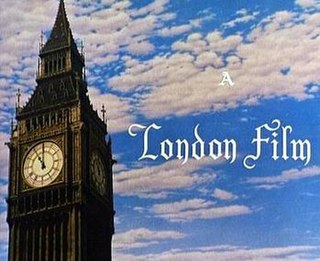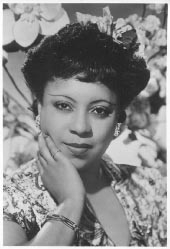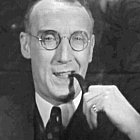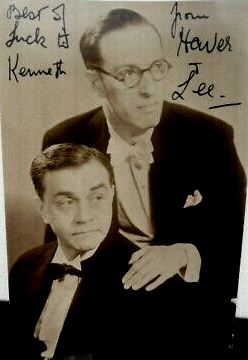Related Research Articles

Music hall is a type of British theatrical entertainment that was most popular from the early Victorian era, beginning around 1850, through the Great War. It faded away after 1918 as the halls rebranded their entertainment as variety. Perceptions of a distinction in Britain between bold and scandalous music hall entertainment and subsequent, more respectable variety entertainment differ. Music hall involved a mixture of popular songs, comedy, speciality acts, and variety entertainment. The term is derived from a type of theatre or venue in which such entertainment took place. In North America vaudeville was in some ways analogous to British music hall, featuring rousing songs and comic acts.

Thomas Henry Sargent, known professionally by his stage name Max Miller and billed as The Cheeky Chappie, was an English comedian often considered the greatest stand-up of his generation. He came from humble beginnings and left school at the age of twelve. At the outbreak of the First World War, he volunteered for the army. During his time in the forces, he started a troupe concert party. On leaving the army, he took up work as a light comedian, dancer, and singer. He toured extensively, appearing in variety, revues and by the early 1930s reached the top of the bill in the large music halls including the London Palladium.

Una O'Connor was an Irish-born American actress who worked extensively in theatre before becoming a character actress in film and in television. She often portrayed comical wives, housekeepers and servants. In 2020, she was listed at number 19 on The Irish Times list of Ireland's greatest film actors.

The Crazy Gang were a group of British entertainers, formed in the early 1930s. In the mature form the group's six men were Bud Flanagan, Chesney Allen, Jimmy Nervo, Teddy Knox, Charlie Naughton and Jimmy Gold. The group achieved considerable domestic popularity and were a favourite of the royal family, especially King George VI.

London Films Productions is a British film and television production company founded in 1932 by Alexander Korda and from 1936 based at Denham Film Studios in Buckinghamshire, near London. The company's productions included The Private Life of Henry VIII (1933), Things to Come (1936), Rembrandt (1936), and The Four Feathers (1939). The facility at Denham was taken over in 1939 by Rank and merged with Pinewood to form D & P Studios. The outbreak of war necessitated that The Thief of Bagdad (1940) be completed in California, although Korda's handful of American-made films still displayed Big Ben as their opening corporate logo.

Adelaide Louise Hall was an American-born UK-based jazz singer and entertainer. Her career spanned more than 70 years from 1921 until her death. Early in her career, she was a major figure in the Harlem Renaissance; she became based in the UK after 1938. Hall entered the Guinness Book of World Records in 2003 as the world's most enduring recording artist, having released material over eight consecutive decades. She performed with major artists such as Art Tatum, Ethel Waters, Josephine Baker, Louis Armstrong, Lena Horne, Bill "Bojangles" Robinson, Cab Calloway, Fela Sowande, Rudy Vallee, and Jools Holland, and recorded as a jazz singer with Duke Ellington and with Fats Waller.

The Victoria Palace Theatre is a West End theatre in Victoria Street, in the City of Westminster. The theatre was designed by Frank Matcham in 1911 and was the last London theatre he designed before his retirement. The building was designated as a Grade II* listed building by Historic England in 1972.

Bernard Delfont, Baron Delfont was a leading Russian-born British theatrical impresario.
William Herbert Lee was an English songwriter. He wrote for music hall and the musical stage, often in partnership with R. P. Weston.

Helena Blackman is a British musical theatre actress, best known for being the runner-up in the hit BBC1 Reality TV programme How Do You Solve A Problem Like Maria?.

Gus McNaughton, also known as Augustus Le Clerq and Augustus Howard, was an English film actor. He appeared in 70 films between 1930 and 1947. He was born in London and died in Castor, Cambridgeshire. He is sometimes credited as Gus MacNaughton. He appeared on stage from 1899, as a juvenile comedian with the Fred Karno company, the influential British music hall troupe. In films, McNaughton was often cast as the "fast-talking sidekick", and he appeared in several popular George Formby comedies of the 1930s and 1940s. He also appeared twice for director Alfred Hitchcock in both Murder! (1930) and The 39 Steps (1935).
Helen Violet Carolyn Delfont, Baroness Delfont, known professionally as Carole Lynne, was a British theatre actress, best known for her work in the 1940s and 1950s. Until his death, she was married to the impresario Lord Bernard Delfont, a prominent figure in the British entertainment industry.

Laurence Hanray, sometimes credited as Lawrence Hanray, was a British film and theatre actor born in London, England. He is also credited as the author of several plays and music hall songs.

Bertha Belmore was an English stage and film actress. Part of the Belmore family of British actors through her marriage to actor Herbert Belmore, she began her career as a child actress in British pantomimes and music hall variety acts. As a young adult she was one of the Belmore Sisters in variety entertainment before beginning a more serious acting career performing in classic plays by William Shakespeare with Ben Greet's Pastoral Players in a 1911 tour of the United States. She made her Broadway debut as Portia in Shakespeare's Julius Caesar in 1912. She returned to Broadway numerous times in mainly comedic character roles over the next 40 years, notably creating parts in the original Broadway productions of Lorenz Hart and Richard Rodgers's By Jupiter (1942) and Anita Loos's Gigi (1951). She worked in several productions mounted by Florenz Ziegfeld Jr., including appearing in the Ziegfeld Follies of 1925 with W.C. Fields and Will Rogers, and starring as Parthy Ann Hawks in the 1929 Australian tour and 1932 Broadway revival of Jerome Kern and Oscar Hammerstein II's Show Boat.

Jack Barty was an English variety show comedian and film actor.

Stars on Parade is a 1936 British musical film directed by Oswald Mitchell and Challis Sanderson and starring Robb Wilton, Arthur Lucan and Kitty McShane. It takes the form of a variety show featuring a number of music hall acts. It was made at Cricklewood Studios in North London. It was a released as a first feature on a Double Bill with the supporting feature What the Puppy Said.
Music Hall is a 1934 British musical drama film directed by John Baxter and starring George Carney, Ben Field and Mark Daly. It was made at Twickenham Studios as a quota quickie.
These Foolish Things was a British revue show. First staged on 12 September 1938 at the Hippodrome in Brighton, it enjoyed a lengthy West End stage run at the London Palladium from 28 September 1938 to 3 June 1939, encompassing a total 489 performances. Featuring in the line-up were The Crazy Gang along with the Sherman Fisher Girls. The show was produced and directed by George Black, who also co-wrote it along with Bert Lee and Harris Weston.

Rene Strange, also known as Renee Strange, was a comic entertainer known as the "singing cartoonist" and for her risqué show using marionettes, which she performed wearing black stockings. She appeared as part of variety performances, on ice, and in pantomime.

Haver and Lee were a British comedy duo who were active between the late 1920s and early 1940s. Haver was Clay Keyes. Lee was Frank Tully. Both also had separate careers – Keyes with his wife Gladys, and as a solo comedian and broadcaster, and Tully as a dancer with his sister Vesta.